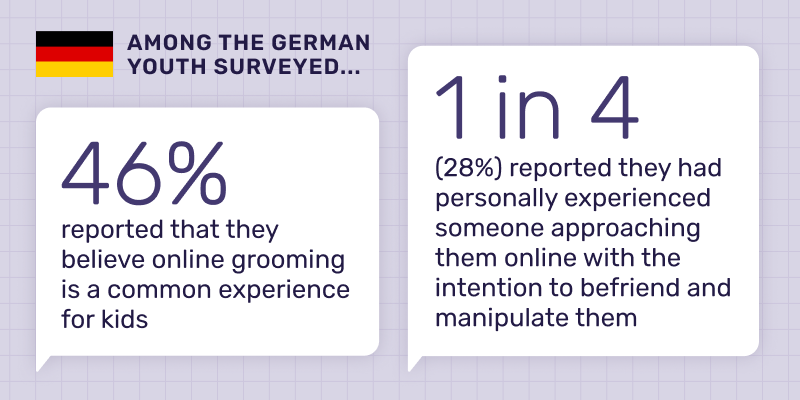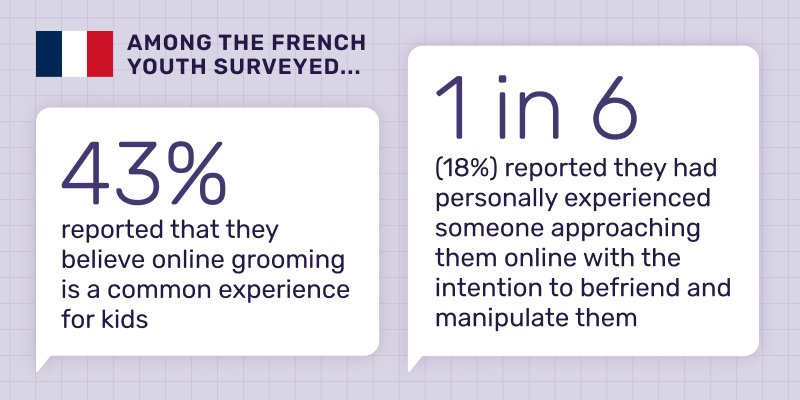[ad_1]
In an thrilling growth of Thorn’s analysis initiatives past the U.S., we’re proud to share insights from our first worldwide quantitative research specializing in youth experiences with digital security, together with on-line sexual encounters and different dangers, in France and Germany.
As Thorn works to teach globally round our challenge area, understanding the web behaviors and attitudes of younger folks in Europe is particularly vital. Ongoing political debates in Europe about on-line security are missing knowledge on youth perspective. That’s why surveying youth not solely in the USA however throughout the globe is a crucial step towards higher understanding youth behaviors on-line and the related dangers they encounter there.
Whereas youth in France and Germany face related threats to at least one one other and to kids within the U.S., the experiences of those younger individuals are distinctive throughout totally different areas, as evidenced by this new analysis.
Understanding the Actuality of On-line Interactions
Our research, which surveyed minors aged 12-16 in each France and Germany, have uncovered insights about their on-line interactions. In response to the analysis, a big variety of minors report experiences of grooming and chilly solicitation requests for nude imagery – a stark revelation concerning the digital panorama many youth navigate every day.
Germany’s Youth Face Distressing Realities On-line
The analysis exhibits that in Germany, the prevalence of grooming and chilly solicitations from strangers is a distressing and prevalent actuality for younger folks.
Among the many German youth surveyed, 46% reported that they consider on-line grooming is a typical expertise for youths, and 1 in 4 (28%) reported that they had personally skilled somebody approaching them on-line with the intention to befriend and manipulate them.

Amongst those that say they’ve been contacted on-line by somebody they’ve by no means beforehand interacted with, 41% stated they’ve skilled a chilly solicitation request for nude imagery, with 18% reporting they obtain such unprompted requests a minimum of month-to-month.
To compound this regarding challenge, the info exhibits minors are typically reluctant to report problematic customers. That is true each after they’ve been made to really feel uncomfortable and after precise on-line sexual interactions. Amongst minors who’ve felt uncomfortable whereas messaging with an online-only contact, 1 in 5 remained in communication with the problematic consumer and fewer than 1 in 10 reported the consumer to the platform.
Amongst German minors who’ve had a web based sexual interplay, like being requested for nude imagery or being requested to “go on cam,” only one in 3 responded by reporting the opposite consumer to the platform. Amongst those that selected to not report the sexual interplay to the platform, they cited embarrassment and a perception that they didn’t suppose the platform would do something.
This clearly illustrates the necessity for actions like enhanced detection algorithms and extra accessible reporting mechanisms, that are important to discourage predatory habits and guarantee a safer on-line surroundings for youth.
Younger Folks in France Additionally Face Threats
On-line grooming is a acknowledged concern amongst French youth, with 43% reporting that they consider on-line grooming is a typical expertise for youths, and 1 in 6 (18%) reporting that they had personally skilled somebody approaching them on-line with the intention to befriend and manipulate them.

The information exhibits French minors are typically reluctant to report problematic customers and as a substitute are extra inclined to dam the consumer in response to on-line sexual interactions.
Whereas 75% used a blocking function after a web based sexual expertise, solely 20% indicated that they reported the consumer to the platform, and solely 14% indicated that they confided to somebody offline.
An analogous sentiment was present in latest analysis Thorn performed amongst U.S. youth, displaying that kids aren’t turning to offline help methods—like having conversations with dad and mom and different trusted adults—though they will play a important position in defending youngsters from hurt.
Given the totally different features of blocking instruments and reporting instruments the comparative charges of minors utilizing blocking as a response in comparison with reporting has vital implications for the event of efficient on-line interventions, particularly these aimed on the prevention of harms.
These Challenges Require a Unified Response
In response to the analysis, whereas the experiences of youth in these totally different areas and the U.S. are distinctive, most of the threats younger folks face on-line are the identical, underscoring the worldwide nature of threats to kids on-line and the common want for sturdy safety mechanisms.
Learn the complete reviews to study extra concerning the on-line experiences of youth in Germany and France.
[ad_2]
Source link




